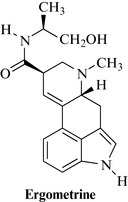Chapter 20 The reproductive tract
Phytomedicines in childbirth
Ergometrine 
Ergometrine (Fig. 20.1) is an alkaloid extracted from ergot (Claviceps purpurea Tul.), a parasitic fungus growing on cereals, usually rye. It is used to manage the third stage of labour (in conjunction with oxytocin), and to control postpartum haemorrhage if the placenta has not been completely expelled. It must be used only under the care of a midwife or obstetrician.
Raspberry leaf, Rubus idaeus L. (Rubi idaei folium)
Therapeutic uses and available evidence
A retrospective observational study on 108 mothers in Australia indicated that a shortening of labour and reduction in medical intervention occurred, with no untoward effects apart from a single case of diarrhoea and anecdotal reports of strong Braxton Hicks contractions. However, a larger, randomized placebo-controlled trial of 192 women by the same authors did not confirm such benefits, although no adverse effects for either mother or baby were noted (Simpson et al 2001). Uterine relaxant effects have been demonstrated in animals (Rojas-Vera et al 2002), and raspberry leaf appears to affect only the pregnant uterus of both rats and humans, with no activity on the non-pregnant uterus. However, no further identification of the active principle(s) has been made and a recent review concludes that in the absence of good clinical data, raspberry leaf cannot be recommended in pregnancy (Holst et al 2009).
Stay updated, free articles. Join our Telegram channel

Full access? Get Clinical Tree



